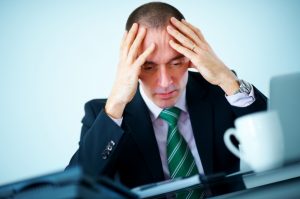Stress and Hair Loss
 Living with stress will not only take a toll on your mental and emotional health, but it can also greatly affect the condition of your hair as well since there is a link between stress and hair loss. Everyone experiences stress from time to time but the amount of stress you endure in your daily life may cause your hair to fall out more rapidly than those who learn to manage their stress. Typically, people lose approximately 100 hair strands in a day but if you are overly stressed, that number can increase and the hairs can fall out at a faster rate. Whether it be work, family, money or relationship issues, anxiety can have a negative impact on your hair and your overall wellbeing. Other stressors that can cause hair loss are as follows:
Living with stress will not only take a toll on your mental and emotional health, but it can also greatly affect the condition of your hair as well since there is a link between stress and hair loss. Everyone experiences stress from time to time but the amount of stress you endure in your daily life may cause your hair to fall out more rapidly than those who learn to manage their stress. Typically, people lose approximately 100 hair strands in a day but if you are overly stressed, that number can increase and the hairs can fall out at a faster rate. Whether it be work, family, money or relationship issues, anxiety can have a negative impact on your hair and your overall wellbeing. Other stressors that can cause hair loss are as follows:
– Severe illness
– Major surgery
– Severe infections
– A change in diet/low calorie, restricted diet
– Decrease in estrogen levels after child birth
Hair Cycle
The normal person’s head contains 120,000 to 150,000 hair strands and with the daily loss of these strands, new strands are developed. During the growth phase, 90% of the hair grows about a ½ inch each month, this phase can last from 2-3 years. At one point, these hairs go into a resting period for about 3 to 4 months which allows the hair to eventually fall out and grow a new strand in its place. The amount of styling and coloring of the hair can create dead ends and dull texture of the hair which may alter the hair cycle.
How to Avoid Stress
There are many methods to help keep stress at bay while developing a good sense of self. Life can be filled with obstacles and anxiety but the way you handle it will make a major difference in your health. Here are some simple ways to avoid stress:
Get enough sleep – An average adult needs 7-8 hours asleep a night to be fully recharged and able to function correctly.
Exercise regularly – You may not have time or money to head to the gym but just being active in your daily routine can decrease anxiety and stress.
Eat a healthy diet – When you eat whole, natural foods, your body feels fulfilled and strong because there are no artificial ingredients that can affect your body in a negative way (weight gain, bloating, ingestion, acne, etc.)
Avoid using drugs, alcohol and cigarettes – Using these substances can alter your mood and create only a temporary escape from the issue.
Decrease the amount of caffeine and sugar consumption – When you take in these substances you will get a temporary rush but then experience a crash. Avoiding caffeine and sugar can help you relax and get better sleep.
Activities for Stress Relief
– Meditation
– Start a stress journal
– Reading
– Do at least 15-30 min of exercise a day (going on a walk counts)
– Spend time with friends and family
– Get a massage
– Take a long, warm bath
– Take a nap
– Turn off all electronics (phone, TV, computer) and enjoy the moment
Conclusion
Stress can put a damper on any situation, including your hair. You can avoid it or take matters into your own hand and learn to deal with it in your own way. Regenepure’s Biotin Conditioner along with the DR and NT shampoo’s help with hair loss, whether it be from stress-related issues or genetics. The ingredients in every Regenepure formula work in unison to help clear the scalp and nourish the hair so it grows back fuller and healthier. The DR shampoo works to cleanse and treat the hair for hair loss while the NT works to nourish and soften the hair. The last step, Regenepure’s Biotin Conditioner, works to moisturize and heal damaged hair for a strong and conditioned finish.